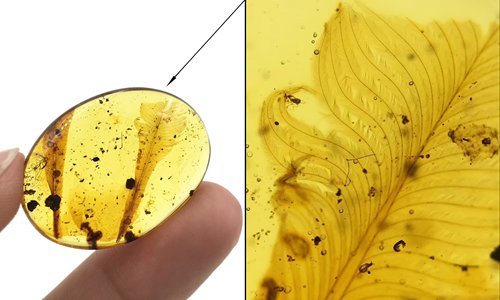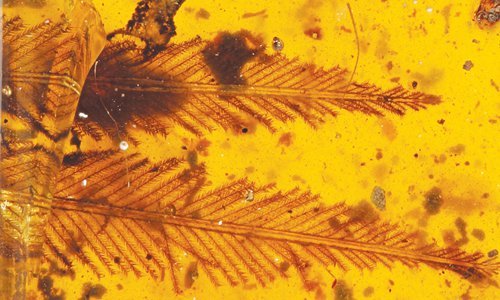

BEIJING, Dec. 16 (Xinhua) -- A team of Chinese and Canadian researchers have found an amber containing the feather of a bird's tail dating back around 100 million years.

Tail feathers with strange central shafts appear in a pair in ambers formed 100 million years ago in North Myanmar. Ambers preserve the structure of feathers and provide more information than flattened fossils. [Photo: globaltimes.cn]
"Unlike most tail feathers that are found in compression fossils, the discovery in amber offers three-dimensional structure of the feather and contains more information," said Zou Jinmei, one of the Chinese researchers.
"The feather dates back to the early Cretaceous, an important period for the evolution of birds," said Xing Lida, assistant professor at China University of Geoscience and leader of the team. "The Age saw how certain types of dinosaur evolved into birds."

Tail feathers with strange central shafts appear in a pair in ambers formed 100 million years ago in North Myanmar. Ambers preserve the structure of feathers and provide more information than flattened fossils. [Photo: globaltimes.cn]
The tail feather in amber was found at Hukawng Valley in northern Myanmar, an area rich in amber fossil discoveries. Amber can contain different kinds of soft tissues, providing valuable palaeontological information, according to Xing.
The findings have been published on the Journal of Palaeogeography.
 Fire brigade in Shanghai holds group wedding
Fire brigade in Shanghai holds group wedding Tourists enjoy ice sculptures in Datan Town, north China
Tourists enjoy ice sculptures in Datan Town, north China Sunset scenery of Dayan Pagoda in Xi'an
Sunset scenery of Dayan Pagoda in Xi'an Tourists have fun at scenic spot in Nanlong Town, NW China
Tourists have fun at scenic spot in Nanlong Town, NW China Harbin attracts tourists by making best use of ice in winter
Harbin attracts tourists by making best use of ice in winter In pics: FIS Alpine Ski Women's World Cup Slalom
In pics: FIS Alpine Ski Women's World Cup Slalom Black-necked cranes rest at reservoir in Lhunzhub County, Lhasa
Black-necked cranes rest at reservoir in Lhunzhub County, Lhasa China's FAST telescope will be available to foreign scientists in April
China's FAST telescope will be available to foreign scientists in April "She power" plays indispensable role in poverty alleviation
"She power" plays indispensable role in poverty alleviation Top 10 world news events of People's Daily in 2020
Top 10 world news events of People's Daily in 2020 Top 10 China news events of People's Daily in 2020
Top 10 China news events of People's Daily in 2020 Top 10 media buzzwords of 2020
Top 10 media buzzwords of 2020 Year-ender:10 major tourism stories of 2020
Year-ender:10 major tourism stories of 2020 No interference in Venezuelan issues
No interference in Venezuelan issues
 Biz prepares for trade spat
Biz prepares for trade spat
 Broadcasting Continent
Broadcasting Continent Australia wins Chinese CEOs as US loses
Australia wins Chinese CEOs as US loses